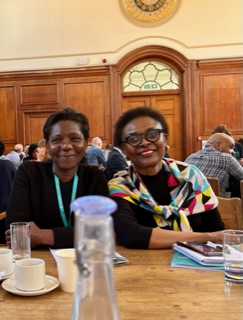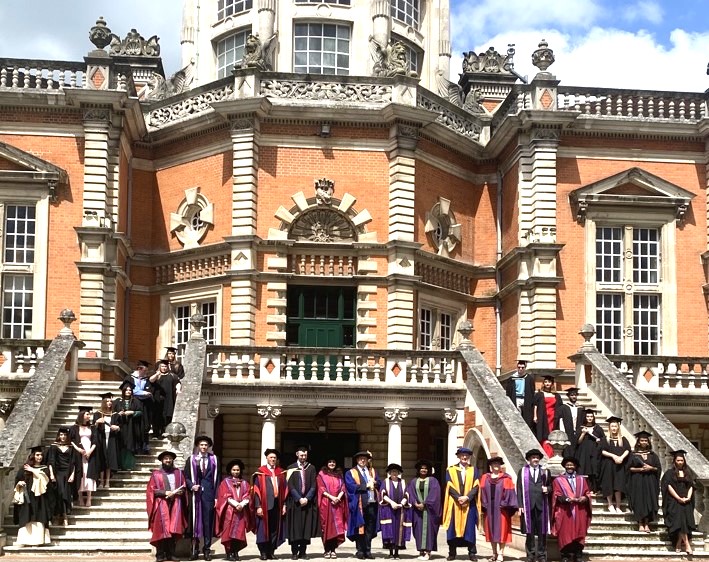Celebrating Excellence in Law Teaching (CELT) 2024 Event – An Expedition in Law Teaching

Celebrating Excellence in Law Teaching (CELT) 2024 Event – An Expedition in Law Teaching
Dr Millicent Ele
CELT 2024 event took place on Friday 14 June 2024 at Goodenough College, London with the theme “What does it mean to be a law teacher?” Professor Rita D’Alton-Harrison and I were in attendance. It was a wonderful opportunity to gather as law teachers to honour outstanding teachers, network, and share ideas to improve our teaching practice as professionals in law teaching.
The meeting began with an interactive session on what it means to be a law teacher - who are we as law teachers and who are our students? What motivates us to put in our best as teachers, to improve students’ engagement, and formulate our individual teaching philosophy? Among a multitude of qualities needed as law teachers, ‘knowledge’ and ‘passion’ came tops. However, although knowledge is an essential ingredient in teaching, majority agree that ‘passion’ is paramount. This was based on the premise that if you are enthusiastic about teaching, you would desire to improve and update your knowledge in your chosen area of scholarship, and you would care about the impact and outcome of your teaching on students.
There was a healthy chunk of discussion on how to maintain a balance between the needs of the students and teachers’ well-being. Many ideas were shared including taking a leave when it is due, not being everything to students but when appropriate, to direct them to where they will get support, and having management improve its involvement in teachers’ well-being.
There were five finalists in this year’s CELT, and they were each invited to give a summary of their teaching practice and innovation in the classroom.
Foluke Adebisi, a professor of law at University of Bristol, who teaches critical legal subject, talked about decolonisation, its promises and whether we can dream of a new world together from within the law school classroom. Foluke attempted to unpack the concept of ‘Decolonising the Curriculum’, outlining some of the ways she has engaged with this topic in her classroom and within the broader legal pedagogy to question possibilities and connect the past to the present inequalities, and then use law as a tool to build a new and just future. Foluke’s teaching approach seeks to “engage, motivate, and inspire students to understand the world around them as a basis to engage with and impact upon it”.
Norah Burns, a law lecturer at Queen’s University Belfast who teaches EU law, tort and international human rights law, shared insights from a Students Skills Assistant Programme which empowers students through skills and societies. This programme supports law students throughout their degree programme, engaging with student societies in a semi-structured secondary programme that helps to shine light on where students need help and assistance. Postgraduate law students participate in co-designing and delivering the programme, which is now an integral part of the Law School programme. Norah’s teaching style was described as incorporating “the principle of Universal Design for Learning”. With the use of infographics, slides and mini podcasts, Norah tries to meet the students’ different learning needs, inspire positivity in learning thus, equipping students with the tools to understand the law and apply it to real world situations.
Kate Campbell-Pilling, a senior lecturer in law at University of Sheffield who teaches property law, land law and equity & trust, inspired delegates to try something new in their teaching practice. Kate’s innovative teaching is adapted from the Traffic Light system in which she uses red, orange and green cards during her teaching sessions to empower students to reflect on their learning and think of how to make improvements. It also enables the teacher to “employ adaptive teaching methods” to meet the needs of the students and facilitate personalised feedback from them. With this method, teaching sessions become inclusive, engaging, and interactive – “empowering the students to drive their own learning.” The approach, therefore, benefits both the teacher and the students, improves dialogue in a variety of ways and leads to improved scholarship outcomes. Kate used this method to teach land law, and equity & trust, and it led to significant improvement in the enrolment in Advanced Land Law which is an elective course (quite a feat). The approach could be used to teach other subjects apart from land law, and it is scalable.
Ruth Flaherty, a senior lecturer in law at University of Suffolk who teaches EU law, land law, equity & trust, explores the integration of an innovative game-based learning in legal education and termed it ‘Teaching “Fun”-damentals.’ This was based on the belief that “sensory experience is key to engagement.” It makes learning memorable and helps students to retain key concepts. The approach aims at improving students’ confidence and reducing fear associated with speaking in public settings, Also, playing/working in teams improves peer interaction, making friends among the students, and a personal connection to the learning materials, thus, improving understanding. Research suggests that promoting confidence, community and a sense of belonging significantly improve student’s well-being and engagement in legal education (Moore and Ni Drisceoil, 2023). Ruth’s approach to teaching proves this to be correct. Overall, this game-based teaching and learning approach highlights the broader effects of incorporating technology and game-based educational innovations to meet the educational needs of the students and create a more positive learning environment.
Darren Weir is a senior lecturer in law in Kent Law School who teaches evidence and criminal litigation. With so many distractions from the internet, students find it increasingly difficult to engage with the learning process. Darren used his previous experience as a criminal barrister, murder mystery producer, and theatre director to create his teaching philosophy. He developed a teaching style that embraces the principles of ‘Edutainment.’ This involves the use of music, drama (edutainment) combined with some aspects of the Socratic method to create what he sees as a form of ‘Gen Z educational evolution.’ Darren believes that ‘to entertain is to educate’ and that under such scenario, students learn in a fun-filled and relaxed environment without knowing they are learning. The style is inclusive, collaborative with an abundant use of humour, music and role-play. These make the law memorable and tangible.
The five finalists were all outstanding law teachers but alas, one must take home the crown. After considering all, including visits to their various schools, interviewing students, colleagues and the management as well as observing the classroom engagement of each nominee and its impact on students, the judges declared Kate Campbell-Pilling of Sheffield Law the CELT 2024 Law Teacher of the Year.
The winner of the 2023 Law Teacher of the Year, Sadie Whittam, a senior lecturer and director of clinical legal education at Lancaster University spoke glowingly about how the accolade was so far, the pinnacle of her profession, how it has opened many doors for her including speaking engagements at education and continuing legal education events. She gave five practical tips for creating an inclusive, fun learning environment where students feel confident and excited to contribute. These are:
- Authentic assessment that is meaningful to the students.
- Use of group work and collaboration sessions because these help students to make friends and to learn.
- Shaking things up – Not doing the same thing all the time. Using a combination of teaching method in each session.
- Gamifying learning – making learning fun.
- Showing passion in teaching
The CELT 2024 event was all about using different methods to teach law, how to improve students’ engagement and empower them to take responsibility in the learning process. The end goal is to arm students with transferable skills to help them navigate the varied career landscapes in law outside the classroom.
For the attendees, the key takeaway was how to bring care, commitment, passion and impact into law teaching.
References:
Moore, Imogen and Ni Drisceoil, Verona ‘Wellbeing and transition to law school: The complexities of confidence, community, and belonging’ in Wellbeing and Transition in Law: Legal Education and the Legal Professional (Palgrave Macmillan, 2023). Url: https://doi.org/10.1007/978-3-031-27654-5_2
To learn more about the Law Teacher of the Year award, please visit: www.oxfordtextbooks.co.uk/lawteacher
























